Support the Journalism of Eric F. Coppolino
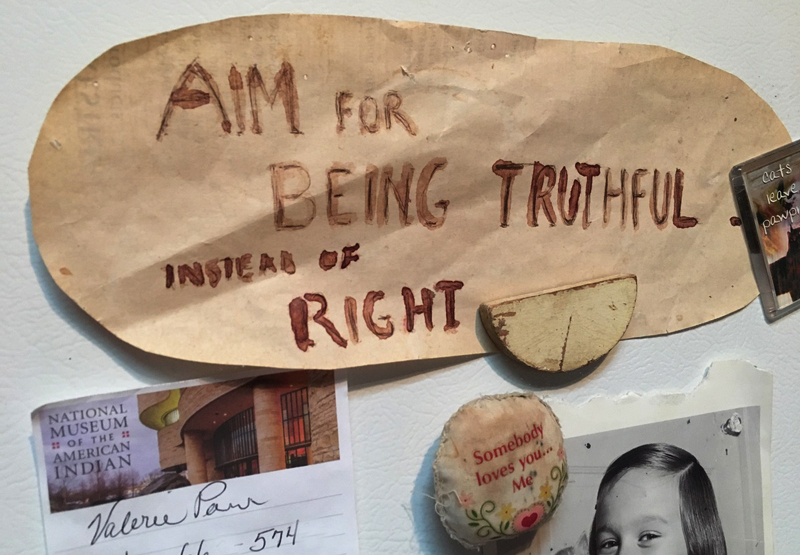
Statement of Li Wojehowski, a top organizer of the Me Too Kingston movement.
“It should be clear to men that it’s time to take a step back and evaluate our ideas about who and what women are, and how to approach women in social and professional situations. It should also be clear that we all need to arrive at a mutually acceptable concept of respect, which can only come through a dialog.”
— from “Take a Step Back” by Eric Francis, February 2018
Overview and Introduction to This Resource
Kingston, Oct. 7, 2019
Dear Friend and Reader:
Welcome.
This unusual resource area documents, in detail, a fraudulent Me Too incident, which took place in the spring and summer of 2018 in the Hudson Valley of New York State. For geographic reference, we’re about two hours north of New York City. The events take place in a rural town of about 23,000 but in reality, on one city block.

This resource area contains published articles, diary entries, professional correspondence, legal pleadings, transcripts, original documents, client testimonials, reader comments, letters of reference, and a prime collection of satires.
Though the episode I’m about to describe was a bit hideous to experience, it was excellent fun to write about. In the midst of fraught mayhem, I took up covering my own situation, and found it to be one of the most exciting assignments I’d taken in years. The scenario starts with journalism.
In April 2018, I was subjected to a coordinated political reprisal for an article I wrote on the “Me Too” movement called “Take a Step Back.” By its detractors, the article was called insensitive, misogynist, bad feminism and a coverup.
“Take a Step Back” asked difficult questions of the Me Too movement — ones that other people were asking quietly and afraid to state publicly. For example it directly addresses the issue of false accusations, and the conflation of minor and serious transgressions. This angered some people, though there’s a lot more to it; you may evaluate that for yourself. One controversial issue seemed to be my advocacy for men and boys.
Calling Out the Exclusion of Male Abuse Survivors

There was, throughout the “Me Too” trend, a kind of segregationist value: male survivors were being excluded from the discussion. No women were accused of misconduct. To not see this bias, you had to be looking in another direction. My feminist training is to hold men and women in equal regard.
From early on, my position was, if we’re going to protect anyone, we need to protect everyone. I was not aware that protecting men and boys, or portraying them as human, in any way implied that women did not matter. But like many things in our era, it was a source of controversy.
A writer coming under attack for a position they take (or are alleged to have taken) is nothing new — and is commonplace in our own times. “Take a Step Back” documents how even Margaret Atwood (the author of A Handmaid’s Tale) was viciously chided by feminists for advocating for a man.
Neither is scapegoating something thing new or novel. Bearing false witness against one’s neighbor is documented in a commandment that dates to the time of Moses. It should not surprise anyone that in the current polarized gender environment as we are living in, an article pointing out certain problems with the “Me Too” movement or even a man having an opinon might bring flack directed at the writer.
In fact, every “accusation” in this drama begins with a critique of “Take A Step Back.” That sounds like some people objected to my point of view. When the time came for an investigation, I was asked whether my writing “made women uncomfortable.” Another person in a position to make a decision said that my allegedly aggressive investigative reporting would be used as evidence against me.
Here’s a little backstory.
Homophobia is perhaps an even more serious taboo. Many men who fall prey to male predators are heterosexual, and don’t want it known by friends or intimate partners that they have had a [homosexual] experience.
— Eric Francis, 10/2017, editorial page of the N.Y. Daily News
October 2017: The First Male “Me Too” Survivor to Speak Out in the New York City & National Media
Among a few other topics, I cover sex and gender. Mostly, I do so in the form personal essays, eBooks and information-based articles. When the “Me Too” movement started, I spotted an issue involving male survivors, and wrote about it. In the article, “Men Get Preyed Upon Sexually, Too,” published by the New York Daily News, I spoke up as the first man in the national media to describe an experience of workplace sexual abuse, involving the drug LSD and a man about 40 years older than I was (I was about 23 at the time).
This was not considered a serious incident at the time; today, it would be considered rape (at least in the social definition, if not legal). I did not need to tell my story for personal healing reasons (or less wholesome motives). Resolving the matter had been long ago accomplished, and I made peace with the person who transgressed me, and the incident itself.

Rather, I spoke out to make sure that other men knew they could.
Though I support the aim of people acting with civility and equanimity toward one another, under whatever circumstances, my primary concern with the “Me Too” movement was that it seemed to deny the existence of male survivors.
Men have enough difficulty speaking up; the taboo on male homosexuality is compounded by the taboo on sexual abuse. So, feeling safe speaking first, I did. However, in a rather stark divergence from the prevailing “Me Too” movement, I refused to name and shame the person involved, or defile his memory. I took a “do no harm” approach, consciously intending to set that as an example.
In my columns and on my radio program, I continued to explore developing events, to some extent being taken on the same roller coaster ride as everyone else: there were some men who appeared to be “obvious” abusers, and some where the attack on them seemed to advance personal or political ends: Al Franken and Garrison Keillor among those.
In my theory of the universe, women, as the source of life, are the teachers. Whether one is right, wrong, or somewhere between, teaching happens by example. If men are being presumed to be in some way ignorant or in need of correction, it will presumably be women who do the teaching — and that will not happen with their words. It will be conveyed by women demonstrating what they believe is correct, through their actions.
— from “Take a Step Back” by Eric Francis
No Vetting, Confirmation of Claims or “Due” Process
What made me the most agitated was the speed with which people were named perpetrators, and then “disappeared” from existence. It was also obvious that there was no careful vetting of accusations — nobody knew what was true and what was false. Asking for proof was and in many ways still is seen as sacrilegious. There was little distinction being made between a joke made in an elevator (the old “5th floor! Ladies lingerie!” line) and sustained, aggressive sexual harassment. Even pointing that out could get someone accused of being a rape sympathizer.
When I read Daphne Merkin’s article in The New York Times (a newspaper I consider to be the marker of the middle of the road public opinion), I felt ready to speak up. The article was called, “Publicly, We Say #MeToo. Privately, We Have Misgivings.” Merkin is a well-known and highly regarded author and a respected feminist.

A few days later, I started writing “Take A Step Back.” It was not an easy article to write. It went through five full drafts, extensive fact-checking, and review by many people in my professional network. I conducted a survey of my readers as part of the research process.
This included my editors at the Daily News, the Planet Waves editorial team, and many friends, lovers and longtime associates. Locally, the Chronogram editors evaluated the piece and signed off as well. Far from being a bit of rogue journalism it was falsely characterized as being (according to the magazine’s former political editor, I forced Chronogram to print it against their will), it was written with impeccable care and approved for publication by Chronogram’s editors. Quotes in the piece represent an honest sampling of the feedback we received from my readers, coordinated by my editorial team.
Among my paying subscribers, one point of contention seemed to be my concern about men and boys rather than favoring girls and women alone. That was a small minority opinion, and I handled those discussions one at a time.
The article reached readers in many locales where I’ve lived and worked, in Europe and across the United States. The only coordinated retaliation, indeed the only objection, occurred in the Hudson Valley, all centered around Chronogram, a publication where I had published in every edition for 22 years. The best reporting of those facts and of Chronogram’s central role is in the civil complaint in Coppolino vs. Luminary Publishing, et. al.
If you are a man, you may find it difficult not to take on some of this projection. However, I suggest you make a conscious choice of not taking responsibility for what you didn’t do, that which is not yours or for whom you are not responsible. You don’t have to accept the projections of others, especially those that would in any way deprive you of your humanity.
— Eric Francis, The Radical Notion that Men are People
Advocating for Men and Boys is Dangerous Business
On rereading “Take a Step Back” more than a year later, what stands out is my advocacy for boys and men who (as we know but don’t like to admit) are sexually abused in a way that is comparable to women and girls: by relatives, in jail, in church, in locker rooms, and everywhere else that is documented, and not. This remains a footnote to the sexual transgression issue when presented by women, if it’s even discussed at all. If you read every article about the Me Too movement, you might think that females are the only survivors, and men are the only perpetrators.
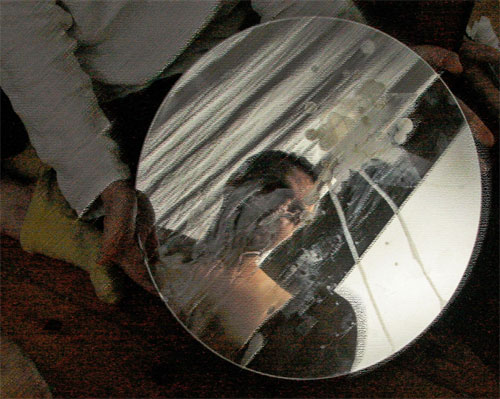
The issue of either false or absurd accusation has many women with sons concerned that their sons are being made paranoid about any exchange with a girl. Those boys are the least likely to be aggressors — they are showing they have a conscience.
Yet at the same time, many who identify as feminists openly mock the issue of how boys feel, thinking that the injuring the social development of a 16-year-old boy is acceptable collateral damage. However, many of my consulting clients are the mothers of boys and young men, and the “Me Too” movement was becoming a cause for deep concern.
To me the movement’s lack of care and consideration for boys and men reveals bald misandry (parallel to misogyny). To me, it also suggests that in public discourse, blame for rape is less about rapists and much more about men generally. This is an example of sex discrimination, as defined in the law and in the dictionary: prejudice based on sex. Those who advocate for men can face the accusation of guilt by association, as happened to Atwood, perhaps the most revered feminist philosopher of our times.
When “Take A Step Back” came out, here in the Hudson Valley, an opportunistic conspiracy theory arose with it: it was said that I had written the article to cover for my alleged nefarious past.I was immediately accused of being the “Harvey Weinstein of the Hudson Valley,” with no specifics to back up this absurd and hysterical claim.
My past — particularly my views about women, my sexual conduct, and the identity of my teachers — has been long documented, in articles (academic and in the popular press), photographs, online books, interviews, astrology talks at major conferences, keynote presentations at conferences, and hundreds of radio programs. I have a lot to say about sex, and I speak freely about many sexual topics, my personal interests, and my views: particularly polyamory (agreed non-monogamy) and masturbation — all for 22 years in a regional magazine, in a small community.
Based on numerous comments and discussion points, my opinion is what appeared to be the actual issue.
If you’re a man who has physical relationships with women, it’s essential that you actually understand something about what a female body is and why it needs special care. Women’s bodies are resilient, amazingly strong and do all kinds of fun and biologically fantastic things that men’s bodies don’t do. They’re also more sensitive and more challenging to maintain. Rise above any ignorance and squeamishness you may have, or any sense that the woman’s body is some alien “other.”
— Eric Francis, The Radical Notion that Men are People
Meet “Me Too Kingston”
Just before “Take a Step Back” came out locally, a group had organized locally called “Me Too Kingston,” led by someone named Hillary Harvey, whom I did not know personally and who did not know me. They were on the lookout for their local Harvey Weinstein, and in me, Harvey had her fictional candidate. First of all, she was Pissed Off about “Take a Step Back,” because it called a purportedly feminist movement to task on their own sexism.

Its author (me) was an internationally famous man in a small community who has a lot to say about sex and was thus a convenient target. Harvey was the self-anointed leader of “Me Too Kingston,” which had just one purpose.
A known political actor, Harvey was reputed for suing one of her neighbors three times, for filing false government complaints against another neighbor, and getting a government official (her husband) to search city records about them, violating their privacy.
Days after “Take a Step Back” came out locally, a Facebook campaign against me began. Harvey jumped in early and took over.
Each new smear began with a critique of “Take a Step Back” — how horrid it was, how misogynist, how offensive, how arrogant or inappropriate or unfeminist or mansplaining, obviously “written by that kind of guy” and so on — and then, each complaint morphed into how I must be such a creeper.
Problem with this theory was, 1. that’s not what the article said and 2. there were no victims.
Instead, I was accused of things like asking to pet a dog, giving someone a poem, yelling at a car that ran a crosswalk I was in, sending someone a text message, or going hiking 22 years earlier. Anything would do. Yet with the help of innuendo and a frantic environment, the meme caught on.
At that time in my life, I was wounded and hurt. I saw the need for someone to step inand address the situation from a restorative perspective, but I couldn’t muster the energy to do it. It was much easier—and frankly, more soothing to my ego—to go along with the attempts to annihilate Eric. The consequences of the campaign have been detrimental. The meetings were organized by Hillary Harvey. I now understand that Hillary did not even know Eric, nor was she ever harmed by him.
— Statement of Li Wojehowski
Thanks to one person — Hillary Harvey, who admitted this openly, in writing — I was “deplatformed” from four different gigs: at the Omega Institute, Chronogram magazine, Radio Kingston and an astrology conference in Florida that came along for the ride. I brought sex discrimination complaints against all three of the New York-based defendants, which forced them all to retain attorneys, make their case, and reveal the contents of their files.
The narrative is documented in full in the article series “Wicked Game,” linked fourth below. Original pleadings from all of of those cases are included below.
Omitting ‘There’s Nothing Here’
You may read “the other side of the story” in this elegantly titled article by my former editor of 20 years, Brian Mahoney: “Make Choices, Have Reasons.” In this article, Mahoney begins by attempting to insult the column I’ve written for him for 22 years.
He then reverses the findings of the investigation that his magazine has conducted, covered in detail in the civil complaint. Mahoney omits that we were in contact all the time through the 20 years of working together; that I live and work on the street where he works; and that he had worked closely with every member of my all-female editorial team for the entire 21st century.

Most significantly, Mahoney omits that his own investigator said, “There’s nothing here.”
The people who came after me thought I would be a slam-dunk. Happily, they were mistaken. They put me and the people close to me through some agony for a while.
Yet as you will read, we went into investigative reporting mode immediately, using all of the tools at our disposal, starting with documenting every word written or spoken. Most of this documentation is published below.
Within the public realm, my writing set the terms of the narrative, pinning down the four corners of the truth and attracting a wide readership and much public support. My clients gifted me a three-week vacation in Burlington, VT, much of which I spent riding a ferryboat back and forth across Lake Champlain. (I discovered again how much I love writing over-water.)
All grief aside, there were some moments during this whole episode that rank among the funniest things I’ve ever seen. And I witnessed some atrocious conduct by my journalism colleagues that I would have never imagined possible.
Our inner relationship is the real thing that most of us struggle with, most of the time we’re struggling. Even if we think we’re struggling in a relationship, what we’re actually struggling with is a relationship with ourselves. If we could figure that out, we would have fewer problems and more solutions. We would know where to look for those solutions.
— Eric Francis, The One and the Many
Living Out Loud
What helped me greatly was that (at the suggestion of a teacher many years earlier) I had spent the past decades of my writing life documenting my sexuality before the public, my clients, my friends and my family. It was difficult for someone to hijack my identity and create a new, supposedly “typical toxic male” kind of story.
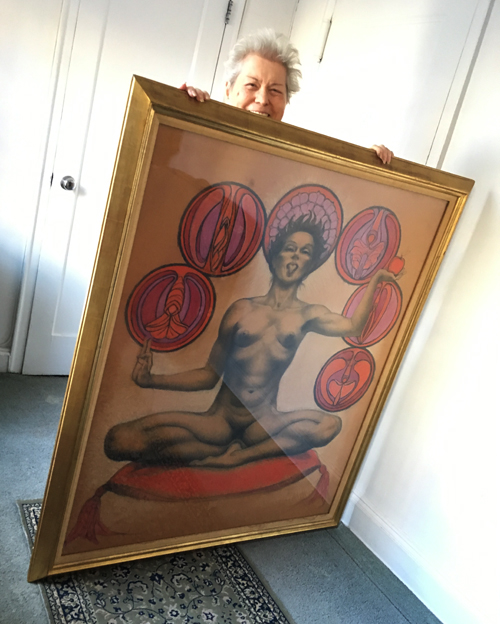
I was already out of the closet, to the point of TMI, or maybe just fun art, though in the end, it worked out.
The Hudson Valley Feminist Collective is entertaining itself these days by making fun of the fact that I write openly about masturbation. To what, exactly, is this relevant?
This discussion has happened despite my 23 years of experience working with Dr. Betty Dodson, perhaps the first-ever sexpositive 2nd wave feminist. (Every member of the sexpositive 3rd wave feminism movement has Betty to thank, me among them.) Here is an example of that writing, from 1998, originally published by my astrological colleague Rob Brezsny on his Televisionary Oracle website. There is lots more from this genre on my YogiSlut website.
Looking back over the past year and a half, I am astonished at the quality and composure of my writing during the crisis. One particular article, written and published at the very low point, is what I consider the best of them — Are You My Mother? It is also the most personal, peering into my family history and reading the whole incident as if it were a dream.
Thank you for reading, and for your loving support and trust.
Anyone wishing to contact me may write to office@planetwaves.net and someone will get back to you shortly.
With love,

Eric F. Coppolino
Oct. 7, 2019, Kingston, N.Y.
(845) 481-5616
PS — I assert ownership over the scenarios described in all of the documents and my own articles on this page, and all of my reportage, including all documents turned over to me for the purposes of reporting this story. I assert ownership of copyright in any medium, plus rights of personality, my images, images of me, my words including quotations, and my personal story. All Rights Reserved per state and federal statutes, including the Uniform Commercial Code and DMCA, at Kingston, New York, United States of America, Oct. 7, 2019 (or the original date of publication of any artwork, article or essay).
Published Articles and Broadcasts | Note: All Pages Open Offsite
It’s gratifying to see the “Me Too” movement surging on Twitter and Facebook, revealing the extent of harassment and abuse of women, encouraged by the many A-list actresses telling their long-suppressed stories about Harvey Weinstein and other workplace predators. Yet we should remember that — though women surely make up the majority of victims — men also can endure this type of abuse, and when it happens, they too are often unlikely to speak up.
— Eric Francis in the N.Y. Daily News
Men Get Preyed Upon Sexually, Too | by Eric Francis Coppolino, N.Y Daily News op ed page
Take a Step Back | by Eric Francis Coppolino, pulished in Chronogram and on Planet Waves, January/February 2018
Reader Responses to Take a Step Back | from the Planet Waves worldwide readership, published Feb. 1, 2018, the same day the piece ran in Chronogram.
The Wicked Game Trilogy
Wicked Game | by Eric Francis Coppolino
The Nature of the Beast | by Eric Francis Coppolino
Facts and Shadows | by Eric Francis Coppolino
Additional Articles
Are You My Mother? | by Eric Francis Coppolino
Analysis of Bad Moon Rising by Jesse Smith
Hey Wikipedia! About Your Biographical Guidelines!
Letters of Reference | Note: All PDFs Open Offsite
Letter of Reference from Dr. Betty Dodson, feminist pioneer and author of Sex for One.
Letter of Reference from Lynda Gale Roberts, founder and owner of Club Relate
Letter of Reference from Carol van Strum, author and investigative reporter
Letter of Reference from Amy Elliott, associate editor of Planet Waves
Letter of Reference from Gail Murphy, the only midwife on Vashon Island, Washington; close personal colleague
Letter of Reference from Loraine Hutchins, radical feminist, author and sex educator
Letter of Reference from Cheryl Corson, student of the Omega Institute
Follow-up Letter of Reference from Cheryl Corson, health & wellness coach
Letter of Reference from Victoria Emory, close colleague on the Planet Waves staff
Letter of Reference from Jeanne Treadway, my longtime client and a former editor of Planet Waves
Letter of Reference from Roni Perlut, longtime Planet Waves reader and subscriber
Statement of Joan Horton, community activist, recanting and correcting her false public accusation against Eric Francis Coppolino
Statement of Li Wojehowski, an organizer of the Me Too Kingston movement, who has admitted that it was a fraud, and that she knew it at the time (en espanol)
Statement of Stephen Bergstein, civil rights attorney, to Chronogram editor Brian Mahoney
Response by Peter von Stackelberg, investigative reporter
Letter from Zosha to Brian Mahoney, editor of Chronogram
I read the entire Book of Blue with such wonderment and awe. It was so clear that you have such reverence for women, and thus used your talents to glorify hidden secrets of femininity. It opened new doors and windows that I had never known existed. I had never felt such confirmation and also protection from anyone.
Primary Sources: Original Documents, Pleadings, Interviews, Transcripts, and official Corporate Statements | Note: All Pages Open Offsite
Draft of the Civil Complaint: Coppolino vs Luminary/Mahoney/Stern/Harvey
Summarized CV for Eric F. Coppolino
Company Statement Regarding Me Too Trolling
Press Release: Coppolino Sues Luminary Publishing
Division of Human Rights Pleading – Radio Kingston | Supplemental File
Division of Human Rights Pleading – Luminary Publishing
Division of Human Rights Pleading – Omega Institute for Holistic Studies
Ryan Poscablo Investigatory Interview from May 2018 | This interview was conducted by former Assistant United States Attorney Ryan Poscablo — a former federal prosecutor from the Southern District of New York. He stipulates for the record that neither he nor Chronogram are accusing me of anything. An analysis of the Poscablo investigation is included in the Luminary Publishing Division of Human Rights pleading immediately above.
Kingston Times – Ulster Publishing
[Addendum, Jan. 9. 2020] — I recently learned that Ulster Publishing, Inc., owner of the Kingston Times group of newspapers, is currently facing two libel lawsuits valued at $8 million. One is for a defamatory advertisement, and the other for an article. Should anyone want to know more about this, I will refer you to the attorney handling the cases. The facts in these cases bear a close resemblance to Ulster Publishing’s conduct in the articles they wrote and published about me.
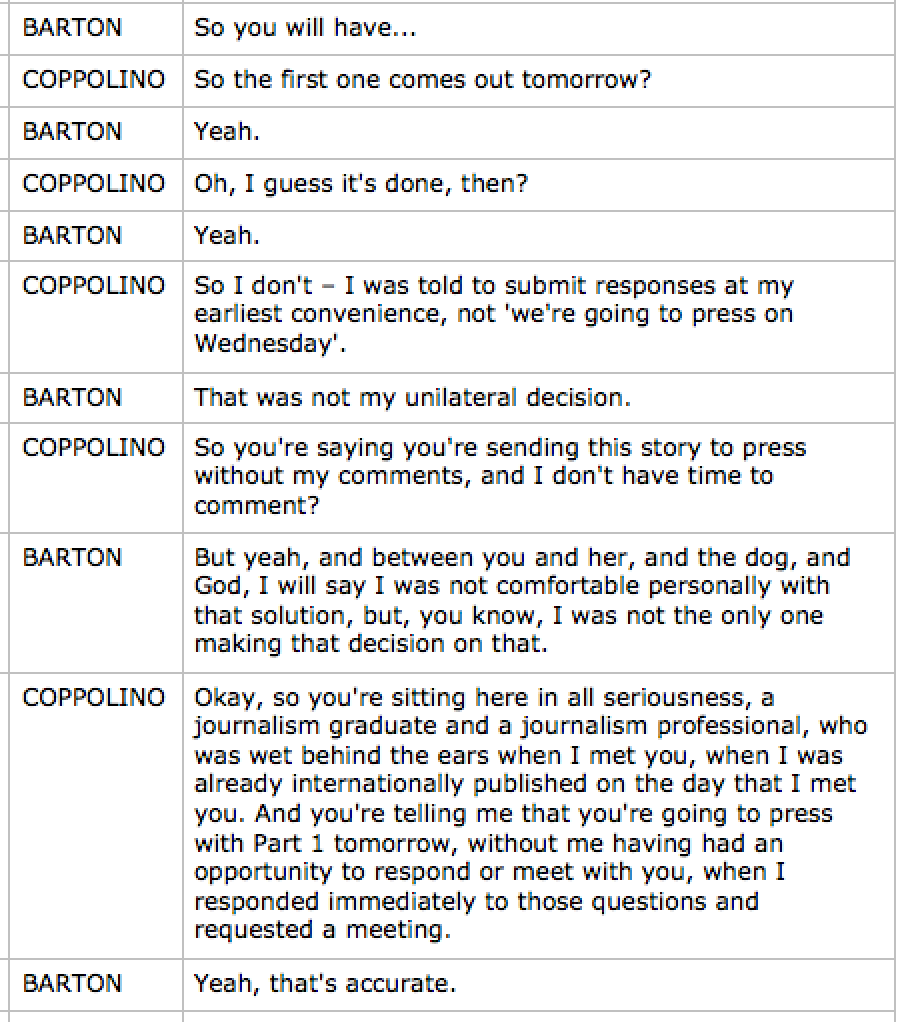
In this interview, Dan Barton, editor of Kingston Times, admits that I was never interviewed for the articles that he supervised and that appeared in print — an absurd, unconscionable violation of journalistic ethics when someone’s reputation is on the line.
What Kingston Times (republished by Hudson Valley One) also omits from the story is that Barton had known me for 28 years and was on the board of directors of Chiron Return, the journalism-based nonprofit that I head — a direct conflict of interest.
The article omits that I had worked for the publishing group as a front-page investigative reporter for 11 years, and had associated with its publisher on and off for 29 years, most recently in an informal capacity on an investigative piece for the Daily News through early 2018.
Their coverage falsely pretends they have never heard of me before this time, and as if I didn’t live down the block from their office, visit almost every day during business hours, and smoke pot in the basement with their editors late at night.
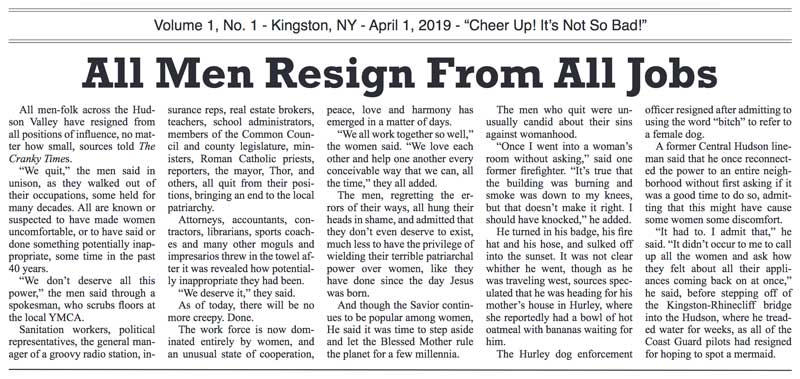
The first sighting of Mystery Girl was at the Outdated Cafe in February, where she ordered a gluten-free dish. But when ordinary bread was served on her plate, she let out a wail and a moan that brought our entire community to a halt, as far away as the Saugerties suburbs.
“It was halfway between a death wail, an orgasm, and Janis Joplin,” said one witness, who spoke on the condition of anonymity. “It went on and on, as if forever, time seemed to stop, and birds were fluttering around her head,” the witness said. “Then, she disappeared.”
Parodies, Humor, Satires | All links open off-site
Mystery Girl Terrorizes Entire City
Mystery Girl Gets Show on Radio Kingston
Mystery Girl Restaurant Review
We Have To Stop Getting Sued for Libel
Kingston to Celebrate New Years with Uptown Orgy
Jesse Smith Interview by the legendary DISINFO website.
Eric is not running a corporate glass tower machine. Anyone familiar with his work knows that he attracts and values empathic, polyamorous relationships. He’s a writer and an artist trying to make a living in a familial and friendly environment, and has the right to consider himself integral to a community ethos he built. #MeToo is trying to force him to define himself by their rules and tomes, and has assumed authority over his public image without a legitimate cause or right to do so.
— Trish, a Planet Waves reader, in a public comment.
Community Response | All links open off-site
Eric’s responses to Ulster Publishing
Responses to the Ulster Publishing articles by “Trish”
Letters of support from our readers
“As a woman and a long time fan and follower of Planet Waves, I have NEVER sensed anything but respect, love, and admiration from you about women and sexuality. I see you as a man of great honesty and integrity and I so believe in your voice and your work. It has been such a joy and comfort to me for so long. I am here to support you — as is your community.”
— Planet Waves reader





I always thought that the point of feminism was to consider men and women equal.
It saddens me that the “Me Too” movement became a tool to beat some people into submission. That, to me, cheapens the experiences of women and men who revealed some of the most painful events of their lives. I see the same thing happening in some respects in the BLM movement, though of course as a white woman I can’t say it in public. Of course no person should be brutalized or killed in police custody. But the fact that we can’t have a sane conversation at times about race, and fear experienced by police doesn’t help solve it. I was married to a cop who beat me, so this for me is saying something!
102